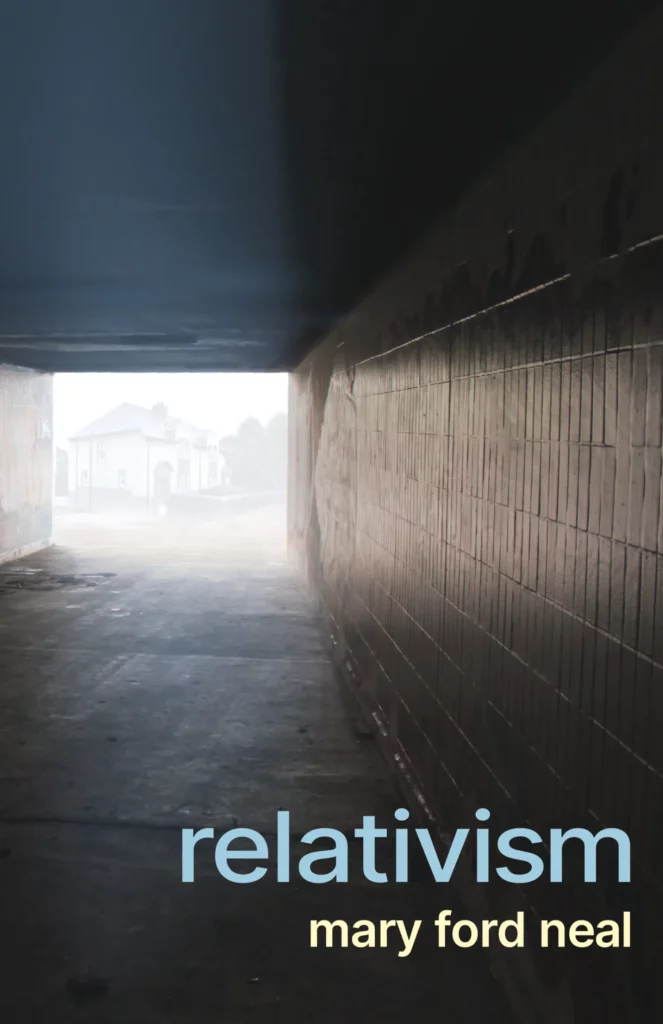Mary Ford Neal
Taproot Press (£9.99)
by Nick Hilbourn
The cryptic theme of distance pervades Mary Ford Neal’s second poetry collection, Relativism. Neal’s ethereal, almost anodyne verse masterfully introduces characters and objects that seem to float above the sediment. At one time, a reader imagines they are witnessing the diatribe of a disillusioned lover, while in almost the same breath that character (often identified by only the pronoun “she”) laments an irreconcilable space within herself or between herself and a deceased (or inaccessible) other. Neal layers the idea of distance over that of absence, asking how we determine whether something far from us was ever really there in the first place. In light of this struggle, the collection troubles the binary of exteriority and interiority, often within the process of re-building a sense of self. The speakers in Neal’s poems are recovering from losses and struggling to identify themselves in the rubble of defunct relationships.
What agonizes many of the narrators in Relativism is the distance between an event and its comprehension in words. The mouth becomes an important symbol in this regard: “She hasn’t shut her mouth in thirty years. / Was it the shock of the savage afternoon…His mouth gaping, like his body—did hers open in silent answer and forget to close again?... Or is it just that putting lips together after all these years would feel like a denial of the bodies.” The closing of lips finishes a traumatic event that has no natural denouement.
In “Pentecost,” Neal carries that troubled closure further, writing, “Sometimes when lips are forced apart in grief or fear / a bird flies in and mates with you for life… There is no why nor anything to do but be a gentle host.” The distance is reconciled by an invading guest (“a bird flies in”) and, in reconciling the physical distance between the speaker and the approaching party, Neal recreates that distance inside the speaker.
In “Elegy Before Time,” Neal further plumbs the burgeoning absence between two people: “I think I know the thrust of what the doctor told you /, but the fingers of your silence are on my lips. / If I could speak, the only thing I’d say would be / Don’t forget me.” To attempt to articulate such an event through speech would be to destroy it, or at least to embark on a foolish endeavor, as a speaker notes in “In expectation of disappointment”: “I believed in their permanence, but they slipped through me like ghosts.” In the world of Relativism, the mouth, whether open or closed, doesn’t consume; it is designed to receive, to be a “gentle host.”
“Care Plan” suggests a starvation of the memory as the ideal mode of reception: “The restaurant was booked for half-past eight. / She said that starving was a gentle death. / Her partner and their friends would have to wait. / She knew that they would summon up the strength.” Don’t attempt to consume the event or process it, the poem implies; people should “have to wait” for the event to find its place naturally within them and form a sense of absence. To Neal, a “gentle death” means refusing to struggle through rationalization of trauma, and instead, allowing the event to disrupt, transform, and fracture one’s ego. The self is a space we walk through and become, not a possession.
Neal dedicates her poem “Apparition” to Mary Oliver and nods specifically to Oliver’s well-known “Wild Geese.” The particular struggle of the self in Relativism parallels Oliver’s poem. Oliver writes, “Whoever you are, no matter how lonely, / the world offers itself to your imagination…” Neal matches that idea of outside interference, but her poems starve those external objects that we absorb to form a sense of self.
For Neal, the self is composed of absence: distances within us, between us, and outside of us. In “Nine colours of my hometown,” she writes, “my sorrow is the shape of his absence…all I know…is that life is a soft, apricot thing / that takes its own duration to ripen, / so that you never enjoy the ripening.” Who we are is formed around a vacuum. As we distance ourselves to observe and organize what we see and experience, we come to understand ourselves, too.
Yet, like Mary Oliver’s geese, Neal’s verse explains that life is an ongoing act of ripening, and so we never truly get to step outside of it and observe. It’s only in the feeling of distance that we gather information about life, and have a chance at comprehending that, in Oliver’s words, we are “heading home again.”
Rain Taxi Online Edition Winter 2022-2023 | © Rain Taxi, Inc. 2023

